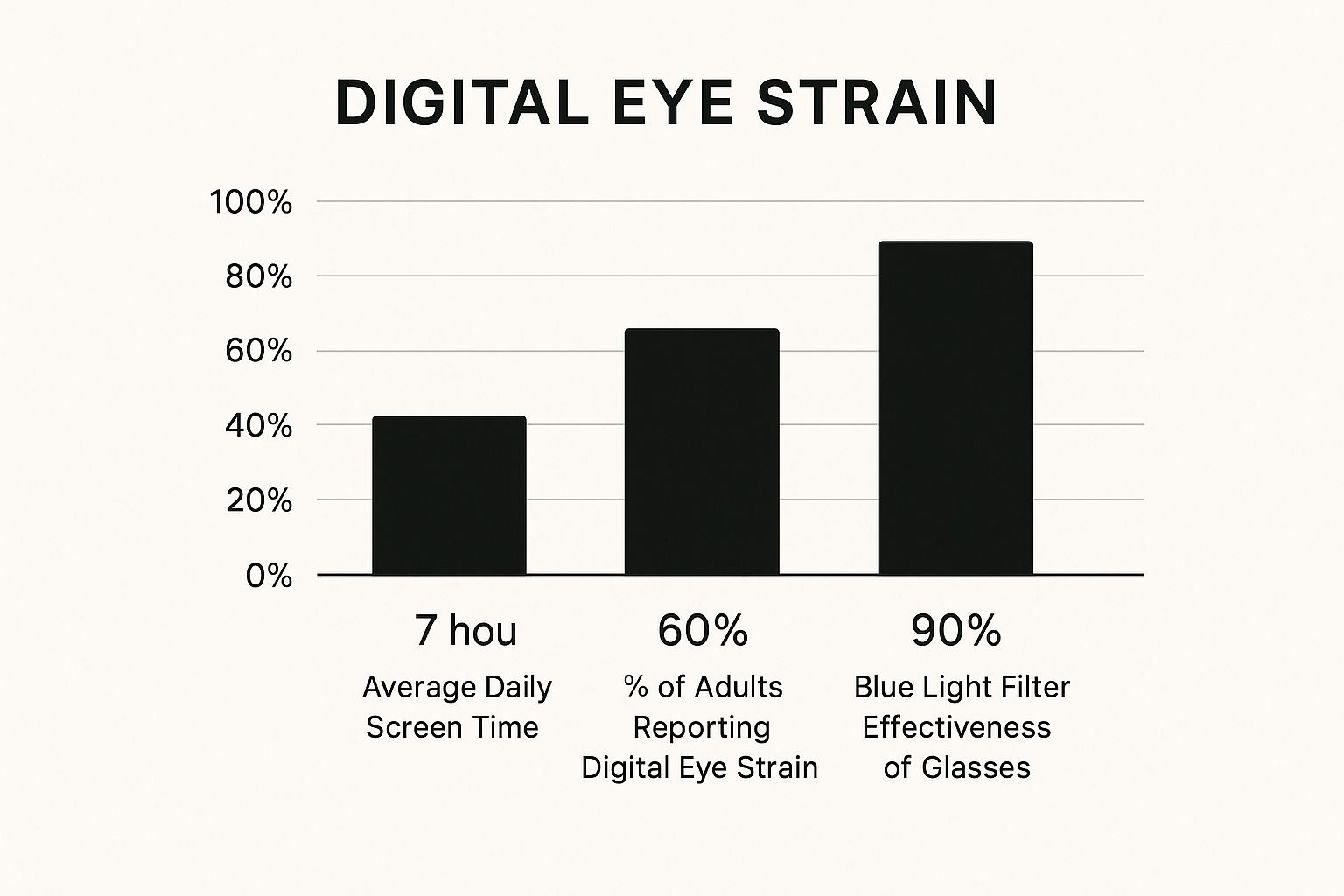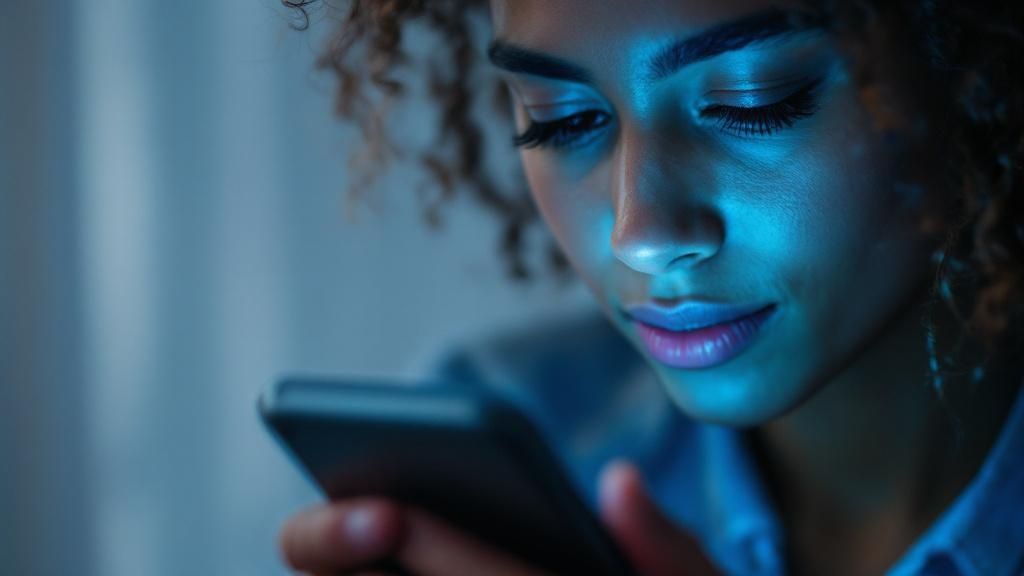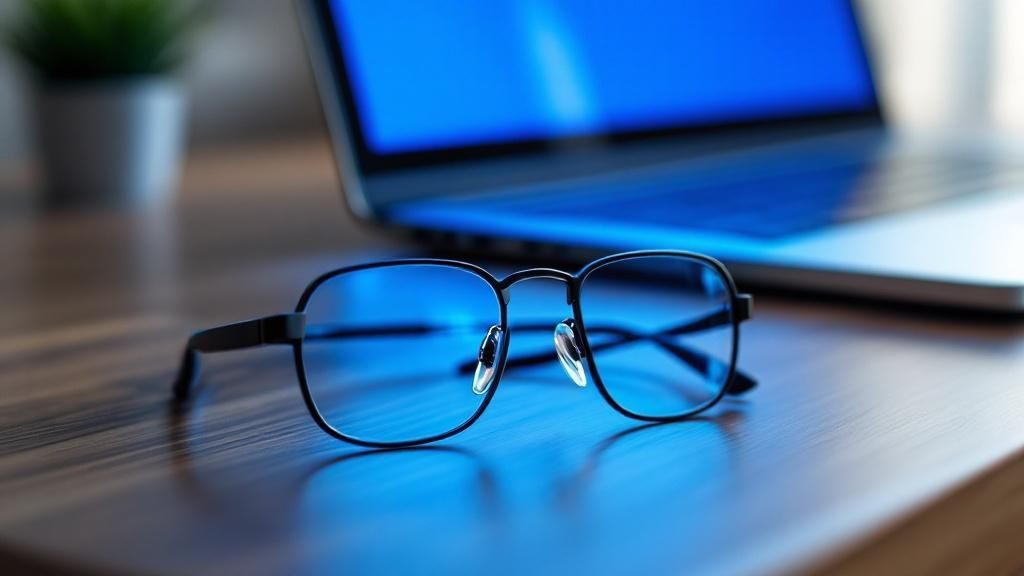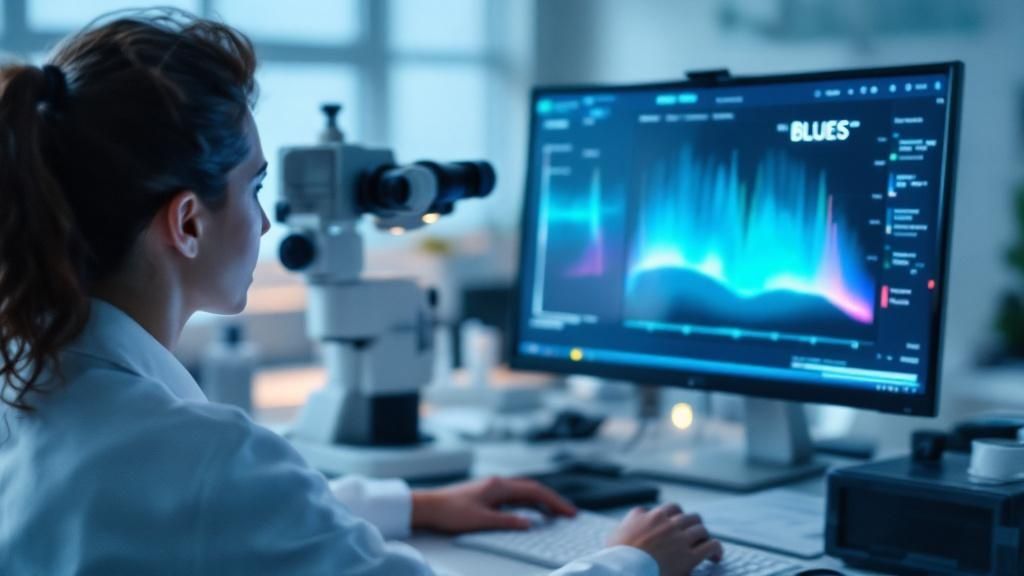
Do Blue Light Glasses Work? The Surprising Truth
So, what’s the real story with blue light glasses? The short answer is that for most people, the evidence is pretty weak. While some people swear by them, major scientific reviews just haven't found solid, consistent proof that they do much to reduce digital eye strain or help you sleep better.
The Honest Answer on Blue Light Glasses
You’re staring at a screen this very moment, and you've definitely heard the claims. The idea sounds simple enough: wear special glasses to filter out the so-called "bad" blue light from your devices, saving your eyes from fatigue and helping you get a good night's rest.
But once you start digging into the actual science, the narrative gets a lot more nuanced. It turns out, that tired, gritty feeling in your eyes after a long day of screen time is often blamed on blue light, but it's usually not the main culprit.
Digital eye strain is a much more complex problem. It's really a perfect storm of several factors, including:
- Reduced Blinking: When we're locked into a screen, we tend to blink way less than we normally would. This leads to dry, scratchy, and irritated eyes.
- Constant Refocusing: Your eye muscles are working overtime to process endless text, images, and videos, leading to genuine muscle fatigue.
- Screen Glare: Pesky reflections and poor contrast on your screen can force your eyes to work even harder just to see clearly.
The core issue usually isn't the blue light itself, but rather how we're using our screens. The symptoms of digital eye strain are very real, but a pair of glasses might not be the fix you're looking for.
This image really helps visualize the disconnect between our screen habits and the gear we buy to "fix" them.

As you can see, there's a huge gap between the skyrocketing rates of screen time and eye strain, and what experts can actually confirm about the effectiveness of blue light glasses. It's a major point of debate.
Claims vs. Reality: A Quick Comparison
With so much buzz, it's easy to get confused. Let's break down what the marketing says versus what the research has found.
| Marketing Claim | What the Science Says |
|---|---|
| Dramatically reduces eye strain | No conclusive short-term evidence. Strain is more likely from blinking, glare, and focus issues. |
| Guarantees better sleep | Findings are mixed and inconclusive. Screen use habits (and built-in night modes) likely have a bigger impact. |
| Protects eyes from screen damage | No evidence that blue light from screens causes long-term eye damage. |
This table makes it clear: the bold marketing claims often get way ahead of the scientific reality.
Despite their surging popularity—especially as our screen time has gone through the roof—researchers have been casting a skeptical eye on the benefits. A landmark 2023 review looked at 17 different clinical trials and came to a clear conclusion: there were no conclusive short-term benefits for reducing eye strain.
The review also found that the data on sleep quality was murky and inconsistent at best. This suggests that for many, the perceived benefits might be more of a placebo effect. You can dig into these blue light study findings and what they mean for you to see the data for yourself.
Understanding the Deal with Blue Light

Before we can figure out if blue light glasses are the real deal, we have to get clear on what they're supposedly fighting. Put simply, blue light is just one color in the visible light spectrum that our eyes can see. Think of a rainbow—light is a mix of different colors, and each one has its own energy level.
What makes blue light special is its short wavelength and high energy. And you’re exposed to it all the time, but probably not from where you think. The biggest source of blue light, by a long shot, is the sun. The amount coming from your phone or laptop is just a tiny fraction of what you get from a walk outside on a clear day.
This is a really important piece of the puzzle. The whole concern isn't that blue light is inherently bad, but about when and how much of it we're getting, especially from our screens after the sun goes down. The conversation really boils down to two potential problems.
The Sleep Disruption Theory
The first major worry is how artificial blue light at night messes with our sleep. Your body runs on an internal clock called the circadian rhythm, which is basically in charge of telling you when to wake up and when to feel tired.
Natural sunlight, which is full of blue light, is the primary signal that tells this clock, "Hey, it's daytime! Time to be alert!" So, when you're staring at a bright screen late at night, you're sending your brain that exact same signal. This can hit the brakes on the production of melatonin, the hormone that makes you feel drowsy.
In theory, by tricking your brain into thinking it's still daytime, late-night screen use could delay sleepiness, shift your sleep cycle, and make it harder to fall asleep.
The Digital Eye Strain Debate
The second big topic is digital eye strain. This is that all-too-familiar feeling many of us get after a long day of screen time.
We’re talking about things like:
- Tired, aching eyes
- Headaches during or after using a computer
- Trouble focusing
- Dry, gritty, or irritated eyes
Many people point the finger at the high-energy nature of blue light as the direct cause of this discomfort. However, eye care professionals often highlight other culprits. Things like blinking less often, annoying screen glare, and the simple muscle fatigue from constantly refocusing your eyes are usually seen as more direct causes of strain.
Understanding these two very different issues—sleep cycles and eye strain—is the key to making an informed decision about whether blue light glasses are a worthwhile solution.
The Real Story on Eye Strain and Vision

The number one reason people buy blue light glasses is to deal with digital eye strain. It’s a compelling idea: just pop on a pair of glasses and say goodbye to the headaches, tired eyes, and blurry vision that come from staring at screens all day. But when you step away from the marketing and look at the actual science, the story gets a lot more complicated.
The real problem here is something called visual fatigue. This isn't just a feeling of being tired; it’s the genuine physical exhaustion of your eye muscles. Think of it like a non-stop workout for your eyes. They’re constantly refocusing, squinting against glare, and processing information without a break. Blue light is definitely part of that environment, but it seems to be more of a bystander than the main culprit.
What Clinical Trials Reveal
When scientists put these glasses to the test in controlled studies, the supposed benefits for eye strain tend to evaporate. In these trials, one group gets real blue light filtering glasses, and another gets a placebo pair that looks identical but has clear, unfiltered lenses. Time and again, the results are pretty underwhelming.
A major review that pooled the results of multiple studies found no real difference in eye strain symptoms between the groups. This strongly suggests that any relief people feel might just be the placebo effect at work. Simply believing something will help can make you feel better, even if the product itself isn't doing anything.
In short, the scientific community has really struggled to find any measurable proof that blue light filtering lenses are better than regular ones for fighting eye strain. The true causes are usually far less glamorous.
So, what are the real culprits? It usually boils down to a few key factors:
- Reduced Blink Rate: We tend to blink up to 66% less when we’re focused on a screen, which is a fast track to dry, irritated eyes.
- Screen Glare: Reflections and poor lighting in your workspace make your eyes work overtime just to see what’s on the screen.
- Poor Ergonomics: Even something as simple as your posture or how far you sit from your monitor can put a ton of strain on your eyes.
Does Blocking Blue Light Affect Your Vision?
Beyond just strain, a common question is whether these glasses actually change the quality of your vision. It makes sense to ask—if you’re filtering out a whole chunk of the light spectrum, does that mess with how you see things?
A detailed 2022 clinical trial dug into this exact issue. Researchers followed adults for six months, giving them lenses with different levels of blue light filtering. The verdict? They found no significant difference in contrast sensitivity, a crucial part of seeing things clearly and sharply, between people wearing blue-blocking lenses and those with plain ones. You can read the full study on blue light lenses and visual perception for all the details.
This is a really important finding. It tells us that while these glasses probably won't harm your vision, the evidence that they actually help with the symptoms of eye strain is incredibly thin. When you ask the scientific community "do blue light glasses work?" for eye comfort, the answer seems to be a pretty clear "no."
Can Blue Light Glasses Really Improve Your Sleep?
Beyond just tackling eye strain, the biggest promise you hear about blue light glasses is that they'll help you get a better night's sleep. The theory is actually pretty solid and ties directly into our body's internal clock, also known as the circadian rhythm. Think of this as your body's master scheduler—it’s what tells you when to feel awake and when it's time to wind down.
Light is the most powerful signal for this internal clock. When your eyes take in bright, blue-heavy light during the day, it sends a clear message to your brain: "Time to be alert!" As the sun sets and things get dark, your brain is supposed to get the opposite signal and start producing melatonin, the hormone that makes you feel drowsy and ready for bed.
Here’s the problem: our modern evenings are anything but dark. Staring at your phone, tablet, or TV late at night bombards your eyes with a concentrated stream of blue light. This can trick your brain into thinking it's still daytime, slamming the brakes on melatonin production and making it much harder to fall asleep.
The Evidence on Sleep Quality
So, does popping on a pair of blue light glasses actually fix this? This is where things get a bit murky, and the science isn't the slam dunk you might expect. While some smaller studies show promise, the results are all over the map and not nearly strong enough for doctors to make a widespread recommendation.
For instance, a few studies looking at specific groups, like athletes or people with certain health issues, hinted that wearing blue-blocking lenses in the evening might help them fall asleep a bit faster. But even then, these studies often found no real difference in overall sleep quality or how long they actually stayed asleep.
This gap between a good theory and real-world proof is a big one. If you want to dive deeper into this specific topic, it's worth exploring the nuances of how anti-blue light glasses can affect sleep patterns in more detail.
At the end of the day, while the idea makes perfect sense, the scientific community just hasn't found the conclusive, large-scale evidence to prove that blue light glasses are a miracle cure for sleep for the average person. Your sleep hygiene habits—things like dimming the lights and putting screens away an hour before bed—have a much bigger and more proven impact.
What Top Health Organizations Conclude

When you want to know if blue light glasses actually work, it makes sense to go straight to the big players—the organizations that comb through all the research. These groups don't just look at one or two studies; they analyze the entire body of evidence to form a consensus for the public.
One of the most trusted names in the medical world is Cochrane, renowned for its exhaustive reviews that are widely considered the gold standard. Their take on blue-light filtering lenses is refreshingly direct.
A landmark 2023 Cochrane review, which scrutinized numerous randomized controlled trials, found that these lenses probably have little to no effect on eye strain, sleep quality, or protecting your retina. The researchers concluded there were no significant short-term benefits when compared to standard, non-filtering lenses. You can dig into the full findings of this comprehensive review for a closer look.
The Official Position on General Use
This conclusion lines up perfectly with the stance of other major ophthalmology groups. The general agreement is that for the average person, there just isn't enough solid clinical proof to recommend blue light glasses for digital eye strain or sleep issues.
The bottom line from the experts is pretty clear: the science doesn't back up widespread use. They consistently point out that while digital eye strain is a very real problem, it's better tackled by changing our habits—not by wearing special glasses.
So why do so many people swear by them? It could be a reduction in screen glare, or even just a powerful placebo effect. If you're still curious about the potential upsides, you can read more about the possible health benefits of wearing blue light blocking glasses.
Ultimately, health experts keep coming back to the basics. Practical, free adjustments—like following the 20-20-20 rule and tweaking your workspace setup—are the most proven ways to keep your eyes comfortable in our screen-filled world.
Proven Ways to Reduce Digital Eye Strain
So, if the science shows blue light glasses aren't a silver bullet, what actually works? It turns out the most effective ways to fight back against digital eye strain have very little to do with fancy gadgets and everything to do with simple, consistent habits. As eye care professionals will tell you, the key to real relief is tackling the root causes—how we actually use our screens every day.
The first and arguably most powerful tool in your arsenal is the 20-20-20 rule. It’s brilliantly simple: every 20 minutes, you just look at something 20 feet away for at least 20 seconds. This small action forces the muscles in your eyes to relax, preventing the exhaustion that comes from staring at something up close for hours on end. Think of it as hitting the reset button for your eyes throughout the day.
Optimize Your Workspace and Habits
Beyond just taking breaks, your immediate environment and setup play a huge role in your comfort. Even small tweaks to your workspace can make a massive difference. For a deeper look at this, you can learn more about how to reduce eye strain from your computer with just a few easy changes.
Here are some quick, actionable steps you can put into practice right away:
- Adjust Your Screen: Your monitor should be about an arm's length away. Make sure the top of the screen is at, or just a bit below, your eye level. This isn't just good for your eyes; it helps your posture, too.
- Control Glare: Harsh reflections from windows or overhead lighting are a major source of strain. If you can't move your setup, think about getting an anti-glare screen filter.
- Use Lubricating Eye Drops: When we stare at screens, we blink up to 66% less than we normally would, which leads to dry, gritty-feeling eyes. A few over-the-counter artificial tears can bring back that much-needed moisture and soothe irritation.
Adopting these proven habits directly tackles the real culprits behind digital eye strain—muscle fatigue, dryness, and poor ergonomics—offering a more reliable path to comfort than simply filtering blue light.
Frequently Asked Questions
After digging into the science, a few key questions always seem to pop up. Let's tackle them head-on so you know exactly what this all means for you and your screen time.
Are Blue Light Glasses Harmful in Any Way?
There’s currently no scientific evidence that blue light filtering glasses are harmful. The main issue researchers point out isn't about safety, but about their unproven claims for easing eye strain.
Essentially, you might be paying for a feature that doesn't deliver a real, measurable benefit for your eye comfort.
What if I Feel Like My Glasses Are Helping Me?
If you genuinely feel better wearing them, there's absolutely no harm in continuing. That positive feeling could be a placebo effect, which is powerful in its own right. It could also be that the glasses are reducing screen glare, and that alone can make your eyes feel more comfortable.
However, it’s still crucial to adopt proven strategies like the 20-20-20 rule. These habits are far more likely to address the real root causes of digital eye strain, giving you more reliable and lasting relief.
Is There Anyone Who Should Consider Wearing Them?
While the evidence for helping the general public with eye strain is pretty weak, some experts do speculate they could be useful for people with specific circadian rhythm disorders or extreme sensitivity to light.
But for the average person asking do blue light glasses work for eye strain caused by screens? The science points to a clear answer: good habits and proper desk ergonomics are much more effective.
